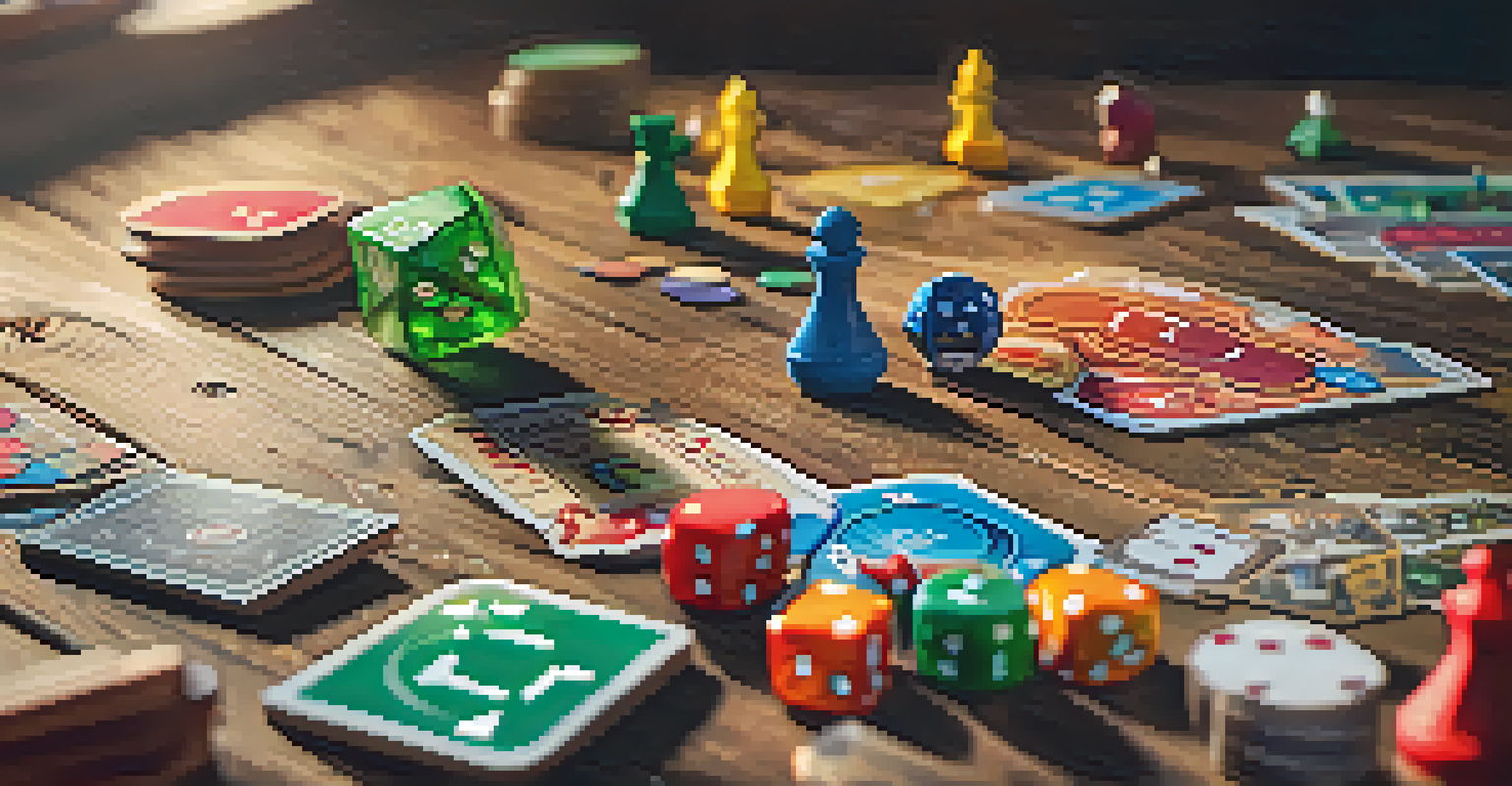The Benefits of Playing Board Games for All Ages

Board Games: A Timeless Tradition for Family Bonding
Board games have been a staple of family fun for generations. They provide an excellent opportunity for family members to come together, share laughter, and create lasting memories. Imagine a rainy afternoon where the whole family gathers around the table, setting the stage for friendly competition and camaraderie.
Games are the most elevated form of investigation.
These games encourage interaction and communication, which can sometimes be lacking in our tech-driven lives. Playing board games allows family members to engage with each other face-to-face, fostering connections that deepen relationships. It's a chance to share stories, strategies, and even the occasional friendly banter.
Moreover, introducing board games to family gatherings can help bridge generational gaps. While grandparents might enjoy classics like Monopoly, younger family members may introduce newer games with different mechanics. This exchange not only enriches everyone's experience but also encourages appreciation for different game styles.
Enhancing Cognitive Skills Through Play
Playing board games is not just about having fun; they also provide mental stimulation that benefits cognitive development. Many games require strategic thinking, problem-solving, and planning, which engage the brain in a way that enhances critical thinking skills. For instance, games like chess demand foresight and strategy, encouraging players to think several moves ahead.

Research has shown that regular engagement in such activities can improve memory and concentration. When players need to remember rules, track scores, or recall previous moves, they are exercising their mental faculties. This is particularly beneficial for children as their brains are still developing, but it also provides mental workout for adults.
Board Games Foster Family Bonds
Board games create opportunities for families to connect, share laughter, and build lasting memories together.
Additionally, board games often present players with challenges that require adaptive thinking. This adaptability can translate to real-life situations, strengthening decision-making skills and the ability to think on one’s feet. So, the next time you roll a die, remember that you’re not just playing a game; you’re also sharpening your mind!
The Social Benefits of Playing Board Games
In our fast-paced world, social interactions can sometimes take a backseat. Board games offer a unique platform for fostering friendships and enhancing social skills. As players engage in cooperative or competitive gameplay, they learn the importance of teamwork, communication, and conflict resolution.
The best way to predict the future is to create it.
For example, games that require teamwork, like Pandemic, encourage players to strategize together, promoting collaboration. This not only strengthens existing friendships but also helps new players feel included and valued. Board games create an inviting atmosphere where everyone can contribute their ideas and strategies.
Moreover, the shared experience of playing games can spark conversations and stories that deepen connections. Whether it's reminiscing about a particularly close game or debating strategies, these interactions help build a sense of community. Ultimately, board games create bonds that can last far beyond the gaming table.
Promoting Emotional Health Through Gaming
Playing board games can significantly boost emotional health and well-being. Engaging in a fun activity provides an escape from daily stressors, allowing players to unwind and enjoy the moment. Laughter, friendly competition, and shared joy create a positive atmosphere that can lift spirits.
Moreover, board games can teach resilience and patience. Losing a game teaches players how to handle disappointment gracefully and encourages them to try again. This cultivation of a growth mindset is essential for emotional development, especially in children who are still learning how to navigate their feelings.
Enhancing Skills Through Play
Playing board games promotes cognitive development, strategic thinking, and problem-solving skills in both children and adults.
Additionally, the act of gathering around a game can provide a sense of belonging and community, which is vital for emotional stability. Whether you're playing with family, friends, or even new acquaintances, the connections formed during gameplay can help combat feelings of loneliness and isolation.
Board Games: A Bridge Between Generations
One of the beautiful aspects of board games is their ability to connect people across different age groups. From children to grandparents, everyone can find joy in the shared experience of gameplay. Classic games like Scrabble or Clue can spark nostalgia in older generations while also captivating younger players with their timeless appeal.
When families play games together, they create opportunities for storytelling and sharing life lessons. Older players can share strategies and anecdotes from their own experiences, enriching the game with personal history. This exchange not only enhances the gameplay but also strengthens familial bonds.
Moreover, the variety of modern board games ensures there’s something for everyone. With genres ranging from strategy to cooperative games, families can explore new and exciting ways to connect. This bridging of generations through gaming not only keeps traditions alive but also fosters mutual respect and understanding.
Encouraging Creativity and Imagination
Board games can be a wonderful outlet for creativity and imagination. Many games invite players to think outside the box, whether through storytelling elements or creative problem-solving. Games like Dixit encourage players to interpret and create stories based on visually stunning cards, stimulating the imagination.
This encouragement of creative thinking can translate beyond the gaming table, influencing various aspects of life. Children, in particular, benefit from these imaginative exercises, which can enhance their ability to express themselves and think innovatively in other settings, such as school projects or personal pursuits.
Games Bridge Generational Gaps
Board games bring together family members of all ages, allowing for the sharing of stories and strategies that strengthen relationships.
Additionally, some board games allow for customization and expansion, encouraging players to develop their unique rules or scenarios. This aspect not only adds a personal touch to gameplay but also nurtures a culture of creativity, where players feel empowered to express themselves freely.
The Joy of Learning Through Board Games
Board games can be a fantastic educational tool, teaching players valuable skills while they play. Many games incorporate elements of math, language, or strategy, making learning fun and interactive. For example, games like Catan can teach resource management and negotiation skills in an engaging way.
This hands-on approach to learning is particularly effective for children, who often thrive in interactive environments. By integrating educational content into gameplay, children can learn important concepts without the pressure of traditional learning methods. It transforms education into an enjoyable experience, sparking curiosity and a love for learning.

Moreover, adults can also benefit from learning new skills or concepts through board games. Whether it's mastering a new language with word games or developing critical thinking skills through strategy games, the learning potential is vast. Ultimately, board games provide a unique blend of fun and education that can enhance knowledge across all ages.